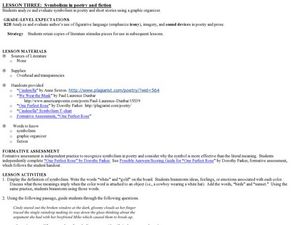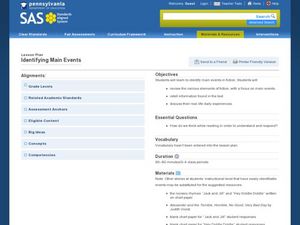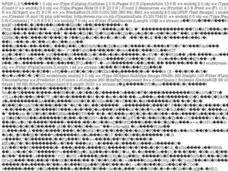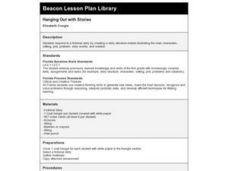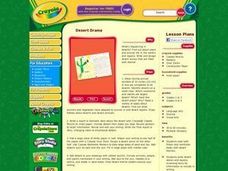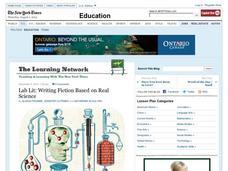Curated OER
Identifying the Theme in a Story
Learners recognize Theme through the use of simple, short stories. Using Pro Quest, students begin by researching the literary element, theme, and how it can be identified. They then identify the themes in Aesop's Fables and...
Curated OER
Symbolism in Poetry and Fiction
Students examine the use of symbolism in literature. In this literary elements instructional activity, students discuss the attributes of symbolism. Students then read selected Cinderella stories and "The Fall of the House of Usher," and...
Curated OER
Identify and Analyze Literary Concepts
Young scholars explore plot structure, conflict, setting, and mood. In this literary elements lesson, students read Rosa Parks, My Story and complete the provided plot outline worksheets. Young scholars discuss the text elements of...
Curated OER
Identifying Main Events
Help kindergartners learn to identify the main events in fiction. They will review elements of fiction, retell information found in the text, and discuss their real-life daily experiences. All the while, they will be asking themselves...
Curated OER
Creating a Science Fiction Story
As the culminating activity in a unit study of science fiction, young writers demonstrate their understanding of the genre by producing their own graphic novel. After deciding on the main elements of their story, individuals use a comic...
Curated OER
Compare and Contrast Two Books
Help your middle school readers recognize the elements of fiction in two books. After reading and taking notes on the details of the books, they write an essay comparing and contrasting the two books. Use this lesson to emphasize...
Curated OER
Introduction To Literary Analysis
Explore the fascinating ways in which authors use specific literary devices to create interesting and realistic texts. Using non-fiction articles with the subject of rogue waves, an excerpt from The Perfect Storm, by Sebastian Junger,...
Curated OER
Pebbles, Sand and Silt -- Categorizing Fiction and Informational Books
Primary readers complete the activities in a Pebbles, Sand and Silt FOSS kit. As a class, they are given a group of rocks and they are to categorize them based on their activities in the FOSS kit. They use this information and apply it...
Curated OER
Hanging Out with Stories
Help your class listen and respond to a fictional story by creating a story structure mobile illustrating the main characters, setting, plot, problem, story events, and solution. Using a coat hanger, they will create an artistic element...
Curated OER
Analyzing the Use of Irony in a Short Story
Ninth graders examine how literature connects to real-life and see how irony aids in the development of theme. They read Shirley Jackson's The Lottery, and discuss elements of foreshadowing and situational irony. Then learners will write...
Curated OER
Understanding Core Values Using the Frayer Model
Young scholars complete the Frayer Model. In this literature instructional activity, students review the concept of theme in literature. Young scholars identify major themes in books they've read. Students learn the attributes of the...
National Endowment for the Humanities
Magical Elements in Magical Realism
How does Gabriel Garcia Marquez make the magical elements of his novel appear so real? That's the challenge facing readers of One Hundred Years of Solitude. Scholars examine the tone and descriptive details Garcia Marquez uses to...
Curated OER
Different Strokes For Different Folktales
Young readers use graphic organizers, such as Venn diagrams and story maps, to analyze a variety of folktales and the elements of a story. They use writing, sequencing activities, and creative art to identify the morals learned from a...
Curated OER
Understanding the Elements of Fiction
Pupils acquire knowledge about the elements of fiction. In this fiction instructional activity students complete a worksheet after listening to a lecture and reading a study sheet about the elements of fiction. The pupils answer...
Curated OER
Rudyard Kipling's "Rikki-Tikki-Tavi": Mixing Fact and Fiction
"Rikki-Tikki-Tavi," from The Jungle Book, offers young readers a chance to examine how Rudyard Kipling uses setting and personification to bring to life the brave mongoose who battles cobras to protect his family. Class members...
Curated OER
Lesson Plan 7: The Elements of Story
Budding novelists work on character development by relating to the characters in their stories. They imagine their own hopes and dreams and recall those of characters from books they've read. Learners also consider struggles the...
Curated OER
Desert Drama
Students read both fiction and nonfiction books with desert themes. Then they write desert stories and reports, reviewing texts for information to include in writing. Students also design desert scenes with details and setting elements...
Curated OER
Come Fly with Me . . . Open a Book: Travels through Literature
This detailed overview of a curriculum unit suggests using travel literature to engage and stimulate your third graders’ interest in reading. The suggested reading list includes fiction and non-fiction materials and offers urban children...
The New York Times
Writing Fiction Based on Real Science - NYTimes.com
Refuse to alienate your scientific-minded young scholars during your creative writing unit. Learners explore how literary writing can reflect observable fact, and be based in actual science. The links include examples of fiction and...
Curated OER
English Literature: An Overview
Relate literary works and authors to the major themes of English literature from the Anglo-Saxon period through the 20th century. Working in groups, high schoolers will evaluate period philosophy, religion, and politics that influenced...
Curated OER
20,000 Leagues Under the Sea
Guide your class on an adventure 20,000 Leagues Under the Sea with this Hampton-Brown outline. It provides educators with a guide to increase reading comprehension, critical thinking, literary analysis, and reading strategies. This...
Curated OER
Fiction vs. Nonfiction
Students explore fiction and nonfiction writing. They identify the elements of fiction in a short story and identify the criteria necessary in a nonfiction piece. Students distinguish the author's purpose in an expository text,...
Curated OER
Elements of Fiction
Students investigate themes and settings in their favorite fiction stories. In this creative writing lesson, students discuss the reasons a fictional story works well and discuss ways to create their own. Students create...
Curated OER
Fiction Elements in Hatchet
Students read or listen to Hatchet by Gary Paulsen, identify elements of fiction, develop writing, thinking, and organizing skills, and create PowerPoint slides based on the story.

